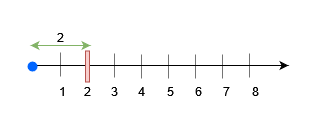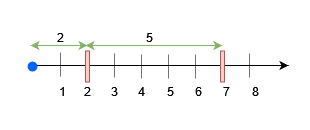LeetCode in Kotlin
3161. Block Placement Queries
Hard
There exists an infinite number line, with its origin at 0 and extending towards the positive x-axis.
You are given a 2D array queries, which contains two types of queries:
- For a query of type 1,
queries[i] = [1, x]. Build an obstacle at distancexfrom the origin. It is guaranteed that there is no obstacle at distancexwhen the query is asked. - For a query of type 2,
queries[i] = [2, x, sz]. Check if it is possible to place a block of sizeszanywhere in the range[0, x]on the line, such that the block entirely lies in the range[0, x]. A block cannot be placed if it intersects with any obstacle, but it may touch it. Note that you do not actually place the block. Queries are separate.
Return a boolean array results, where results[i] is true if you can place the block specified in the ith query of type 2, and false otherwise.
Example 1:
Input: queries = [[1,2],[2,3,3],[2,3,1],[2,2,2]]
Output: [false,true,true]
Explanation:

For query 0, place an obstacle at x = 2. A block of size at most 2 can be placed before x = 3.
Example 2:
Input: queries = [[1,7],[2,7,6],[1,2],[2,7,5],[2,7,6]]
Output: [true,true,false]
Explanation:

- Place an obstacle at
x = 7for query 0. A block of size at most 7 can be placed beforex = 7. - Place an obstacle at
x = 2for query 2. Now, a block of size at most 5 can be placed beforex = 7, and a block of size at most 2 beforex = 2.
Constraints:
1 <= queries.length <= 15 * 1042 <= queries[i].length <= 31 <= queries[i][0] <= 21 <= x, sz <= min(5 * 104, 3 * queries.length)- The input is generated such that for queries of type 1, no obstacle exists at distance
xwhen the query is asked. - The input is generated such that there is at least one query of type 2.
Solution
import kotlin.math.max
class Solution {
fun getResults(queries: Array<IntArray>): List<Boolean> {
val m = queries.size
val pos = IntArray(m + 1)
var size = 0
pos[size++] = 0
var max = 0
for (q in queries) {
max = max(max.toDouble(), q[1].toDouble()).toInt()
if (q[0] == 1) {
pos[size++] = q[1]
}
}
pos.sort(0, size)
max++
val left = UnionFind(max + 1)
val right = UnionFind(max + 1)
val bit = BIT(max)
initializePositions(size, pos, bit, left, right, max)
return listOf<Boolean>(*getBooleans(queries, m, size, left, right, bit))
}
private fun initializePositions(
size: Int,
pos: IntArray,
bit: BIT,
left: UnionFind,
right: UnionFind,
max: Int,
) {
for (i in 1..<size) {
val pre = pos[i - 1]
val cur = pos[i]
bit.update(cur, cur - pre)
for (j in pre + 1..<cur) {
left.parent[j] = pre
right.parent[j] = cur
}
}
for (j in pos[size - 1] + 1..<max) {
left.parent[j] = pos[size - 1]
right.parent[j] = max
}
}
private fun getBooleans(
queries: Array<IntArray>,
m: Int,
size: Int,
left: UnionFind,
right: UnionFind,
bit: BIT,
): Array<Boolean> {
val ans = Array<Boolean>(m - size + 1) { false }
var index = ans.size - 1
for (i in m - 1 downTo 0) {
val q = queries[i]
val x = q[1]
val pre = left.find(x - 1)
if (q[0] == 1) {
val next = right.find(x + 1)
left.parent[x] = pre
right.parent[x] = next
bit.update(next, next - pre)
} else {
val maxGap = max(bit.query(pre), x - pre)
ans[index--] = maxGap >= q[2]
}
}
return ans
}
private class BIT(var n: Int) {
var tree: IntArray = IntArray(n)
fun update(i: Int, v: Int) {
var i = i
while (i < n) {
tree[i] = max(tree[i], v)
i += i and -i
}
}
fun query(i: Int): Int {
var i = i
var result = 0
while (i > 0) {
result = max(result, tree[i])
i = i and i - 1
}
return result
}
}
private class UnionFind(n: Int) {
val parent: IntArray = IntArray(n)
init {
for (i in 1..<n) {
parent[i] = i
}
}
fun find(x: Int): Int {
if (parent[x] != x) {
parent[x] = find(parent[x])
}
return parent[x]
}
}
}

